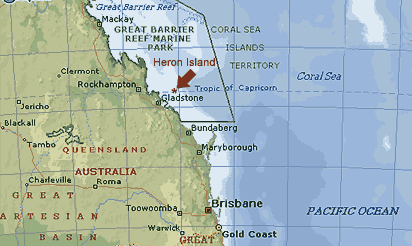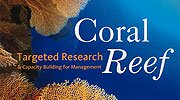|
Central South Pacific/Australasia:
Heron Island Research Station,
The University of Queensland, Australia
 Address: Address:
Centre for Marine Studies
The University of Queensland
QLD 4072
Australia
Ph: 07 3346 9418
Fax: 07 3365 4755
Website:
Heron Island Research Station
Centre for Marine Studies
Principal contacts:
COE Rep:
Business Manager CMS, Kate Nuttall
Deputy Vice-Chancellor (Research) ,
Name and affiliation
Heron Island Research Station, Centre of Marine Studies, University of Queensland, Australia
Local Area Description
Heron Island is a 16 hectare, densely forested sand cay, on the leeward edge of a flourishing platform coral reef 80 kilometres offshore from Gladstone. Bisected by the Tropic of Capricorn, Heron reef is home to around 900 of the 1500 species of fish and around 72% of the coral species found in the Great Barrier Reef; not unnaturally researchers find this smorgasboard of specimens on their doorstep a most attractive feature.
Established in the early fifties, the first permanent building (which is still in daily use) was constructed in 1953. The station has grown steadily from then to a complex of over thirty buildings and one of the world's principal coral reef research stations. Built on a lease of 2 hectares from Queensland Parks and Wildlife Service, Heron Island is about 800 metres long and 300 metres wide at its maximum.
The research station can cater for up to one hundred researchers and students and is operated by a permanent staff of eleven. In 2002, it hosted over 2000 researchers and students, with researchers and education groups from twenty nations using the station. Station users came from Brazil, Canada, Denmark, England, Finland, France, Germany, Ireland, Italy, Mexico, New Zealand, Norway, Portugal, Spain, Sweden, the People’s Republic of China, Russia, Scotland, the United States of America.
In 2002 it hosted the second major GEF Targeted Reef collaborative workshop and planning meeting.
Regional collaboration
1. Local / regional partners, linkages to non-government organizations (NGO's), government agencies:
The Centre for Marine Studies/University of Queensland has linkages at both state and federal levels. CMS scientists are on key advisory committees – including the Biodiversity Advisory Committee. This committee sets listing for organisms among other things – e.g. the Convention of Biological Diversity.
CMS and UQ are both connected via its officials to state and federal government ministers. The Inter-governmental Oceanographic Committee has regional representation via the Coral reef Targeted Research Project Executing Agency (CRTR PEA) and its Australian delegates. These link directly to the Federal government.
2. Regional and international research partners / networks:
The CMS is a member of the Tropical Marine Network(TMN), a joint research and teaching program of the University of Sydney, the University of Queensland, James Cook University and the Australian Museum. This network involves six research stations and stretches over 1600 km of the Great Barrier Reef.
The Centre for Marine Studies is involved in international research and linkages,
- The Director is on the council of ISRS
- The Deputy Director is secretary of WIOMSA Board and has projects in East Africa (Tanzania);
- Discussions have been held to extend the TMN across the Pacific (to include the Berkeley research station, Moorea).
- The CMS has a MacArthur Foundation proposal in the Solomons starting this year (Dr Norm Duke, “Conserving the Marine Biodiversity of Marovo Lagoon, Solomon Islands.”).
- The CMS has been instrumental in the formation of the Great Barrier Reef Research Foundation that has an international office (in SF) and has international development and marine conservation in its mandate.
- The CMS Director serves on the International Scientific Advisory Committee of the Foundation.
- The Centre is also a major player in the Australian Coral Reef Society and the Australian Marine Sciences Association.
- Close linkages to Great Barrier Reef Marine Park Authority (GBRMPA)
Examples of international research projects:
- 2003-2006: Tracing the origins of stress in the symbionts of reef-building corals. (ARC Large, DP0346647), partners in USA.
- 2004-2006: Solar radiation, coral bleaching and climate change. (ARC Large, DP0453361), Partners in USA, Mexico, Denmark.
- 2004-2006: Ecology, physiology and molecular microbiology of coral disease on the Great Barrier Reef. (ARC Linkage, LP0453609); Partners in Israel.
- 2002-2006: Vision and remote sensing: using nature’s technology to examine the health of The Great Barrier Reef and Moreton Bay. (ARC Linkage, LP0214956), partners in Russia.
- Extensive collaboration with NOAA’s Coral Reef Watch program
3. Student exchange:
The Centre for Marine Studies has a distinguished record in the field of international education. All study packages for international students and student groups are designed to make the most of the wonderful marine life that abounds on the Queensland coast. Students may invariably expect to spend time at our premier research stations on Moreton Bay and the Great Barrier Reef.
The staff at the Centre for Marine Studies and associated faculties include leaders in many fields of marine studies.
Among CMS programs are:
- Study Abroad courses open to students enrolled with the University of Queensland;
- Contract Programs for overseas college groups;
- Special Short Courses in topics in marine studies.
- Technical specialty courses (e.g. PAM fluorometry, ecotoxicology, Coastal zone management)
International Students are welcome to enroll in Undergraduate and Postgraduate studies at the University of Queensland.
4. Linking science to management and policy advice:
The Centre is linked into local partners at the Queensland State government level.
At the Federal level, the Centre has strong linkages with the Great Barrier Reef Park Management Authority and the Australian Institute of Marine Science.
5. Linkages to local or regional NGOs, activities/projects with relevance to Coral Reef Targeted Research:
CMS has a large number of research projects in the area of coral reefs, coastal zone management and climate change. These are mostly funded by the Australian Research Council or by local stakeholder funding (e.g. Natural Heritage Funding).
6. Linkages to Coral Reef Targeted Research working groups (WG) and COE activities:
- The CMS Director is the Chair of the Bleaching Working Group(BWG),
- The Deputy Director is member of the BWG,
- Close research collaboration exist with Disease WG and Remote Sensing WG.
- Training workshops (of graduate students/researchers from BML and other marine labs and coastal resource managers) in field techniques developed by the WGs e.g., inventorying disease, pathogens; deploying stress markers and other monitoring tools.
- Dialogue and Outreach on implications of research results in the context of local issues (e.g., connectivity findings, reef restoration techniques, disease incidence and epizootiology).
|

